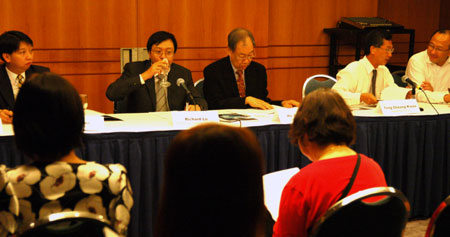
TECHCOMP HOLDINGS held its AGM on Friday (Apr 25) at Suntec City with about a dozen shareholders in attendance.
The number of shareholders may be small but they were interested investors who engaged the management in a lively Q&A session.
As background, Techcomp’s historical performance is set out in the table below. For FY ’07, Techcomp has recommended a first and final dividend of S$0.012, unchanged from the previous year.
| 2005 | 2006 | 2007 | Change % (FY 07 vs FY 06 | |
| Revenue (US$’000) | 44,617 | 54,842 | 65,819 | 20.0 |
| Net profit (US$’000) | 3,687 | 4,350 | 6,011 | 38.2 |
| Net profit margin | 8.3% | 7.9% | 9.1% | N.A. |
| EPS (US cents) | 2.73 | 3.22 | 4.30 | 33.5 |
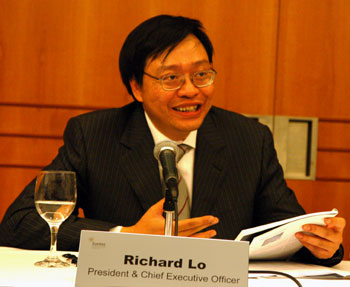
The following is an edited version of the Q&A session at the AGM which was chaired by Richard Lo, president and CEO of Techcomp:
Q On Apr 9, Techcomp announced that Kabouter Management has become a substantial shareholder of Techcomp. The notice said that the change of interest took place in January 2008. Why was there a delay in disclosing this to the public?
Gilbert Sin, financial controller: The company was informed of the change by Kabouter just a day prior to the announcement.
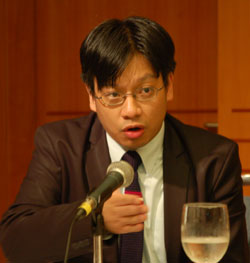
What does that mean?
Gilbert: In our opinion, the customers have the ability to pay up as many of them are government-funded. The age of the receivables is due to an unique feature of the industry. Some of the payment terms depend on the period of the warranty of the equipment. We can collect the retained sum after the warranty period and such amount outstanding is maybe 5-10% of that particular order value.
Q I am concerned about the depreciating US$. Why is your reporting currency in US$ when you do most of your business in China and HK?
Richard Lo, president & CEO: Most of our trades are in US$. Even in mainland China, by practice, most of our orders for the import of equipment are concluded and settled in foreign currency, namely, the US$.
Q Have you adjusted your selling prices to account for the falling US$?
Richard: We have taken some measures. We transfer some of the cost increase due to the currency fluctuation to the customers. We also work with our business partners to share the problem.
Q Which currencies are your costs denominated in?
Richard: Most of the operating costs are in local China currency, partially in HK$ and in Singapore dollar as we have subsidiaries in Hong Kong and Singapore.
Q When will the manufacture of safety cabinets start? It’s a long time since you announced that last year.
Richard: We are starting now. Safety cabinets are something different. We have to comply with a lot of certification and approval before we can start manufacturing them. It’s difficult to predict exactly when you can get the licence. But we have the licence now.
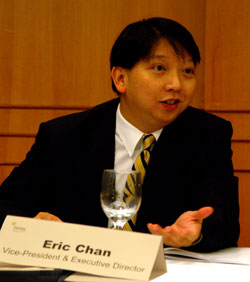
Q What’s the production capability like?
Eric Chan, vice-president: We have a target but that information has not been disclosed. This AGM is not an appropriate place to disclose it. We will disclose it when it's appropriate.
Q In some reports, you have said that India is a major growth market. I notice that in last year’s performance, there’s not much hoo-ha about India. The focus seems to have shifted to Indonesia and Australia.
Richard: The growth in India is in line with our expectations. We are expecting strong growth this year.
Q Are most of the customers in India government-funded?
Eric: It’s of a similar profile as what we have in China.
Q What about Indonesia and Australia?
Eric: The pattern is quite similar in Indonesia but in Australia there is more private sector clientele.
Q On page 3 of the annual report, what is the meaning of the following sentence: “Despite the lukewarm sentiments for growth in the industry and these cost pressures, there are strong indications for healthy growth and immense business opportunities that await Techcomp in the years ahead”?
Richard: There’s a lot of uncertainty in the macro economy but we are still confident that Techcomp can have healthy growth in the coming years. By ‘strong indications’ I was referring to market demand, general increase in expenditure in healthcare, etc.
Q The bulk of the profit of the company usually has been in the second half. Will this pattern continue?
Richard: We are expecting a similar pattern this year.
Q Will the high oil price affect Techcomp?
Richard: Not directly. We are not particularly affected.
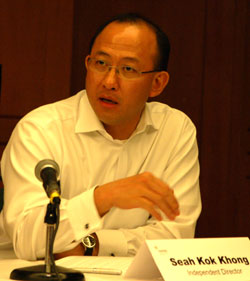
Q Last year, you issued new shares. Why was that done instead of taking a bank loan?
Richard: The company intended to grow faster by looking for opportunities for acquisitions or expanding in other geographical areas. It’s good to have some reserves on hand because you never know when the opportunity will come. By issuing new shares, we don’t have to worry about the cost of funds.
Seah Kok Khong, independent director: The board reviewed the situation and decided it was more prudent to issue new shares.
Q Techcomp’s profit has doubled since 2003 but the share price has underperformed since IPO.
Richard: I’m also a shareholder and care about the share price but the major role of the management is to deliver the fundamentals. I believe in the long run, if we deliver consistently, the share price will reflect the true value of the company.
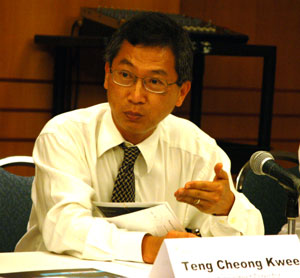
Q Do you have a dividend policy?
Teng Cheong Kwee, independent director: This is something the board has been reviewing on a continuous basis each year. The board is mindful of shareholder interest and wishes for the company to commit to a dividend policy. Last year, in view of the fact that the company has peformed well, the Board considered it proper that the company declare a dividend for shareholders.
The company is growing very fast and there are always plans for growing faster, organically or through M&A. The company is still relatively small by international standards.
We feel there are opportunities for growth that require resources - that’s why we raised some funds last year of about US$7.7 million. It’s not a big sum. Therefore, we think it would be prudent to retain part of the profits for such possibilities. For this reason, we feel we should not at this stage be locked into a fixed dividend policy.
Kok Khong: We feel we can maintain the dividend as much as possible, and then as the company grows to a larger scale, an increase in dividend rate can then be considered.
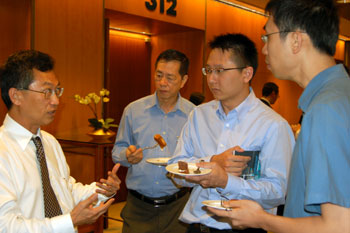
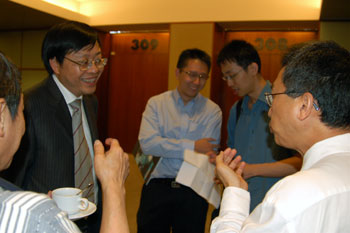
Recent Nextinsight story: Mystery buyer: Who is new substantial shareholder of TECHCOMP and HMI?






